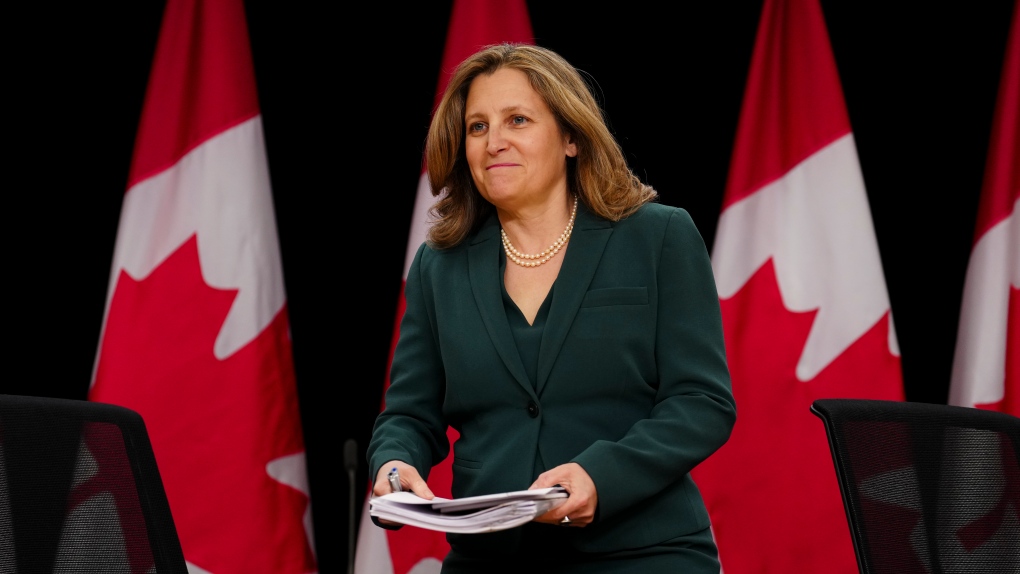Achi news desk-

Going ahead with increasing Canada’s capital gains inclusion rate is a “sowing division,” and is a “short” way to improve the deficit, business groups are warning Finance Minister Chrystia Freeland.
In a new letter sent to Canada’s chief financial steward and deputy prime minister, six of the country’s largest industry organizations are voicing their concerns that the policy change will stifle economic growth and come at the expense of the prosperity of future generations. .
“Simply put, this measure will limit opportunities for all generations and make Canada a less competitive, less innovative nation,” read the letter.
“Whether it’s through a reduction (of) new company and job creation, reducing the availability of medical practitioners, eroding hard-earned pension earnings … or threatening the retirement plans of millions of Canadians who pinned their plans on the proceeds of a family sale. cottage or small business … the effects will ripple from coast to coast.”
Canadian Chamber of Commerce, Canadian Federation of Independent Business, Canadian Manufacturers and Exporters, Canadian Venture Capital and Private Equity Association, Canadian Franchise Association and Canadian Canola Growers Association are signatories.
The 2024 federal budget included a proposal to increase the inclusion rate on capital gains from 50 percent to 67 percent for individuals who earn more than $250,000 in capital gains in a year, and for all corporations and trusts.
Since releasing the budget, Freeland and Prime Minister Justin Trudeau have faced pushback about the policy from doctors worried about their savings, and entrepreneurs with their new mindset.
The Liberals have repeatedly defended their plan to target Canada’s highest earners, and in the process rake in billions in additional revenue, as a fair way to help offset other major investments in housing and the safety net Canadian social.
Although the government has promised that this would affect about 12 per cent of Canadian corporations and Canadians with an average income of $1.42 million, critics have warned that any individual making $250,000 or more in profit on the sale of assets of such that its effects are felt more widely. as a secondary or rental property.
“The claim that increasing the inclusion rate to 67 per cent will only affect a small percentage of the wealthiest Canadians is misleading. In fact, one in five Canadians will be directly affected over the next ten years and the effects of this tax increase will be borne by all Canadians, directly or indirectly,” the letter is reading
Last week, Freeland reaffirmed her intention to move this tax change forward, choosing to leave the necessary legal reforms out of the omnibus budget implementation bill. Instead, she plans to introduce separate legislation focused on this measure which will move through the Senate on its own timetable, forcing the opposition parties to take a clear stance.
“We are very committed to the capital gains measures,” Freeland said. “Our opinion is that it is completely fair to ask those in our country, who are at the top, to contribute a little more.”
On Thursday, Freeland’s office told CTV News that while it’s understandable that groups may have questions about new tax changes, when designing the parameters of this policy, it was done with Canadian productivity in mind.
Noting that the finance minister remains committed to the plan she has put forward, the individual who spoke on the background challenged concerns about stifling economic growth, noting that Canada’s average marginal effective tax rate continues to be more advantageous to new businesses than US rates.
According to Finance Canada, in 2021 only about five per cent of Canadians under the age of 30 had any capital gains at all. And, next year 28.5 million Canadians are expected to have no capital gains income, while three million are expected to earn capital gains below the $250,000 annual threshold.
Although Freeland has yet to reveal the legislation, this tax change is expected to apply to capital gains realized on or after June 25, 2024.
Industry organizations are calling on the federal government to remove the “unwise inclusion rate increase” before it takes effect. Instead they want an independent review of Canada’s tax system as a whole.
“Under successive governments, our tax system has become a complex web of carve-outs and caveats. Our country must end its reliance on tax and spend politics, which undermine innovation and growth at the expense of Canadians today and future generations,” the letter reads.
“As Canada’s economy grows, so does our tax base – all without the need for tax increases that will hurt Canada and limit our collective potential… There is a better way. We are ready to roll up our sleeves and work with you to help Canada get there.”
In a separate letter sent Thursday morning, Canada Business Council President and CEO Goldy Hyder echoed the concerns raised by other business groups.
“Based on the information provided to date, we are concerned that the proposed changes will further undermine Canada’s ability to attract investment and talent,” Hyder said in his letter to Freeland.
“More importantly, we believe that the debate over capital gains taxes throws up even more concern – namely that the government’s fiscal framework is unsustainable. No tax increases would be needed if the government reduced its planned spending and took proactive steps to stimulate growth, such as removing regulatory barriers.”
Ad blocking test (Why?)





Source link
Related

